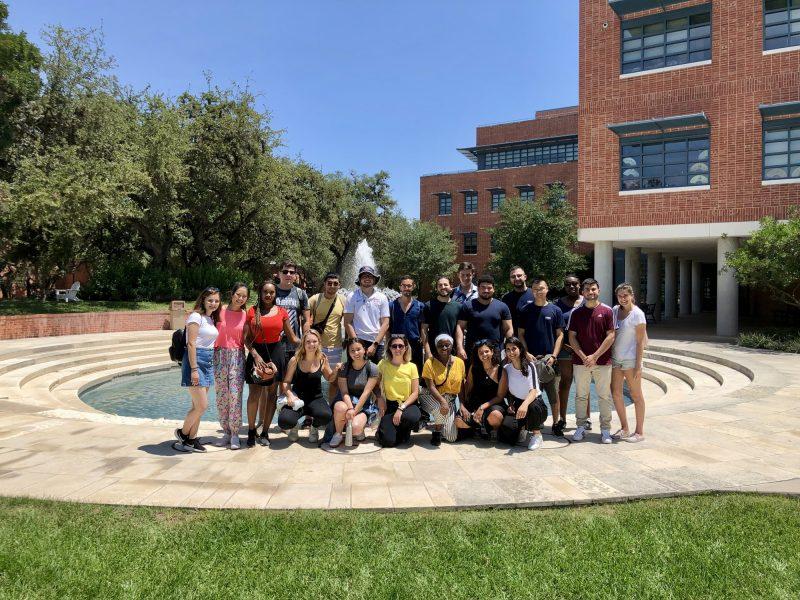After spending four weeks at Trinity, 30 students from Germany gave final presentations about identity, integration and success on Sept. 12 in the CSI Treehouse. The group was part of the Fulbright Diversity Initiative, and all had migrant backgrounds, meaning that either they or at least one of their parents migrated to Germany. The students returned home on Sept. 15.
During the presentations, several students gave talks about their experiences with identity and their migration backgrounds or shared facts about Germany, including statistics about people who have migrated to Germany.
Habiba Noor, coordinator for the Fulbright program, assigned the presentation to the Fulbright students but did not give them a topic.
“I thought the presentations were amazing,” Noor said. “They were really well done. These are very good students, they are very mature, and they put it all together on their own. The presentations were all them, I just gave them the task.”
Lina Ashour, Fulbright scholar, gave a presentation about identity, which included reading a children’s book that she wrote at the age of 10. The book is called Meine Farbe, which means “My Color,” and it is about a cucumber who learns to accept herself as she is.
“From a young age I started writing, and I remember vividly I just started writing that book in my thoughts,” Ashour said. “My dad saw it and read through it, and he wanted it to be published because the essence of it is so important. Then we re-published it two years ago because it’s now on a basis of donations.”
The book is now being distributed to refugee children in Germany.
“It’s a bilingual book. It’s German and Arabic,” Ashour said. “My idea behind it was if I give it to refugee children, they get an easy book where they can better their Arabic and learn German, and also that the message behind it sticks with them. They are facing a lot of troubles, they have to leave their home, they have to re-identify themselves, and by having this simple reminder that being you is okay, I hope helps them in some way.”
While in Texas, the Fulbright scholars visited places in San Antonio, Austin and Laredo. They learned about culture, art and religion, and they visited the national border.
“Texas is a state that’s on the border, and it has such a huge influence nationally and also locally,” Noor said. “The trip that we had organized was one that was done by border patrol. It had a particular perspective. We’re approaching this with a critical perspective because before they went we read a book about unaccompanied minors coming to the U.S. We didn’t go with this intention of criticizing, just to see, and they’re the ones that are controlling the region, so they gave us an enormous amount of access to things. It was a very interesting experience.”
Arsel Cem Ilhan, Fulbright scholar, was surprised by some of the things that he observed on this trip to the border.
“We got to know all the border patrol agents,” Ilhan said. “I think all of them were Hispanic, so all of them had a migration background. It was a unique experience. Border patrol agents get vilified a lot, and there are reasons for it because the policies may suck, but you understand their perspective. It’s not black and white, it’s more nuanced than that.”
Ilhan also shared his reflections on his time meeting people in Texas.
“People have been so open, so friendly all the time,” Ilhan said. “If we go into a random burger place, or if we go into a shop, people instantly are so friendly. They ask about us, they want to know about us, it’s that southern hospitality that we really got to experience. I’ll miss that about Texas a lot.”
Ashour found her experiences of meeting people in Texas to be different than her expectations in some ways.
“They’re not what Texas is portrayed as,” Ashour said. “People say that they have a lot of prejudice, that they’re too simple, not open for diversity — they are. I felt very welcomed, and I felt like I could blend into the crowd, and I was part of everything when I was here. I didn’t feel like an outsider because everyone took care of me and wanted me to be part of the entire thing.”
However, Ashour felt that a negative thing about America is the way that race is perceived here.
“It’s always revolving around race, which is kind of weird because on one side you feel so integrated and part of the thing although you might not look American, and on the other side everyone keeps talking about race and how it is still so ingrained into the society, and you have to find your way out of it and out of the system,” Ashour said. “In Germany, you cannot put the word race equal to a human being. For us, all humans are equal and what we differentiate in is more the heritage. It’s not about your race in that sense, no one would ever say that, but they would ask you about your heritage.”
Trinity students who are interested in interning for the Fulbright program next year can contact Noor at [email protected].







